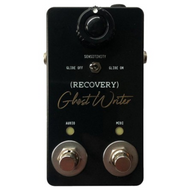Ghost Writer - Recovery Effects
by Sam Chittenden
When I was 14 I had a friend whose dad had a Roland guitar synth. I only played it a handful of times, but the synth sounds were a ton fun to control from the guitar, and I was enthralled by the sounds that came out as a result of my hackneyed lead attempts. I’ve run my guitar into my modular system before but always approached it as an overly expensive effects processor, so I was excited when Recovery Effect’s new Ghost Writer pedal came across my desk. The Ghost Writer is an audio to MIDI converter pedal that provides a dead-simple way to control synths or other MIDI connected instruments from your guitar.
The pedal’s interface is straightforward, with bypass footswitches for both audio and midi that allow you to toggle audio pass-through and MIDI information transmission respectively. There is a glide switch to add a little bit of portamento to the generated MIDI data, and a sensitivity control for dialing in the responsiveness of the MIDI signal generation. MIDI data is transmitted out the rear of the pedal via a 3.5mm TRS jack (MIDI type A). An adapter cable (to 5-pin DIN) is not included with the pedal so you’ll need to have one on hand unless you are connecting directly to a device that accepts MIDI over TRS.
Set up is easy and there is no onboard configuration other than the sensitivity knob. MIDI is transmitted on channel 1 and the pedal is easily hot-swapped between different synths, as long as they're set up to receive on channel 1. Technically, any audio signal present at Ghost Writer’s input will generate some form of MIDI data, but I found the, most predictable results with short, individual notes with a nice attack. Chords? Well, not so much, although you can get some interesting—if a bit chaotic—results. The MIDI data generation is quite sensitive and the jitter of the data translation can take some getting used to and playing sustained notes or more legato phrases introduced more tracking jumps, but adapting my playing to get smoother results didn’t take too much effort. Getting clean output from lower notes was also a bit tricky, but in general there was a pretty decent sweet spot on the neck in which I could noodle around and find success.
As stated, both the audio pass through and the MIDI generation can be toggled on or off and it is nice to have these simple controls for maximum flexibility in your signal flow. The guitar can be solely a MIDI controller and the audio pass through is great for setting up your synth accompaniment to harmonize along with your lead lines, or provide other complementary tones over or under your guitar playing. Since it’s MIDI coming out the other side, you can let your imagination run loose with how to use that data, and apart from playing monosynth lines [super fun!] or doing your best Steve Vai-esque harmonized solo-fest you can also use the MIDI notes to trigger different samplers or sequencers. Depending on your available MIDI gear and your tolerance for experimentation your results may vary, but I had a ton of fun with the different approach to controlling my gear. If you are looking for a way to bring your guitars and synths together, the easy set-up, nearly flat learning curve, and the fluid options for novel control it opens up make the Ghost Writer a no-brainer.
Price: $229


